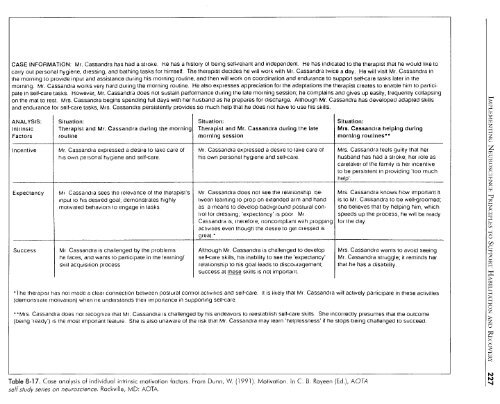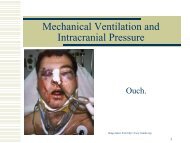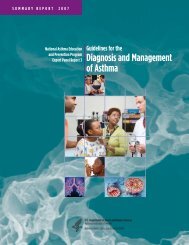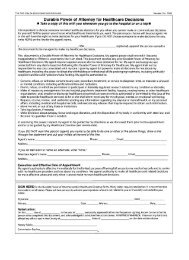Implementing Neuroscience Principles to Support Habilitation and ...
Implementing Neuroscience Principles to Support Habilitation and ...
Implementing Neuroscience Principles to Support Habilitation and ...
You also want an ePaper? Increase the reach of your titles
YUMPU automatically turns print PDFs into web optimized ePapers that Google loves.
ZASE INFORMATION: Mr. Cass<strong>and</strong>ra has had a slroke. He has a hislory ol be~ng selkelianl <strong>and</strong> independenl. He has indicaled lo the rherapisl that he would hke lo<br />
:arry oul personal hygiene, dressing, <strong>and</strong> balhing lasks for himself. The lherapisl decides he will work wilh Mr. Cass<strong>and</strong>ra lwice a day. He will visit Mr. Cass<strong>and</strong>ra in<br />
he morning lo prov~de input <strong>and</strong> assislance during his morning rouline, <strong>and</strong> lhen will work on coordinalion <strong>and</strong> endurance <strong>to</strong> support sekare lasks later in the<br />
norning. Mr. Cass<strong>and</strong>ra works very hard during Ihe mornlng rouline. He also expresses apprecialion for Ihe adaplalions Ihe lherapisl creates <strong>to</strong> enable him <strong>to</strong> partici-<br />
3ate In sell-care lasks. However, Mr. Cass<strong>and</strong>ra does no1 suslain performance during Ihe lale morning session; he complains <strong>and</strong> gives up easily, frequenlly collapsing<br />
3n the ma1 lo resl. Mrs. Cass<strong>and</strong>ra begins spending full days with her husb<strong>and</strong> as he prepares for discharge. Although Mr. Cass<strong>and</strong>ra has developed adapled skills<br />
3nd endurance lor selfcare lasks, Mrs. Cass<strong>and</strong>ra persislenlly provides so much help lhal he does no1 have <strong>to</strong> use his skills.<br />
L\NALYSIS:<br />
lnlrinsic<br />
Fac<strong>to</strong>rs<br />
Situallon:<br />
Therapisl <strong>and</strong> Mr. Cass<strong>and</strong>ra durlng Ihe rnornin~<br />
rouline<br />
Sltuatlon:<br />
Therapisl <strong>and</strong> Mr. Cass<strong>and</strong>ra during Ihe late<br />
mornlng session<br />
Siluallon:<br />
Mrs. Cass<strong>and</strong>ra helplng durlng<br />
mornlng roullnes"<br />
Incenlive<br />
Mr. Cass<strong>and</strong>ra expressed a desire lo lake care of<br />
h~s own personal hyg~ene <strong>and</strong> self-care.<br />
Mr. Cass<strong>and</strong>ra expressed a desire lo take care of<br />
h~s own personal hyg~ene <strong>and</strong> selkare.<br />
Mrs. Cass<strong>and</strong>ra leek guilty lhat her<br />
husb<strong>and</strong> has had a stroke; her role as<br />
carelaker of the fam~ly is her lncentlve<br />
lo be perslslent In provid~ng '<strong>to</strong>o much<br />
helo'.<br />
Expectancy<br />
MI CaSSaildra sees the relevance of the therapist's<br />
Input <strong>to</strong> h~s aes~red goal, demonslrales highly<br />
mol~valed behawors <strong>to</strong> engage in tasks<br />
Mr Cass<strong>and</strong>ra does no1 see the relat~onsh~p between<br />
learn~ng <strong>to</strong> prop on exlended arm <strong>and</strong> h<strong>and</strong><br />
as a means <strong>to</strong> develop background postural control<br />
for dressmg. 'expeclancy' 1s poor Mr<br />
Cass<strong>and</strong>ra IS, lherefore, noncompl~ant w~lh propplnS<br />
acllvltles even though the aeslre lo get aressea IS<br />
great '<br />
Mrs. Cass<strong>and</strong>ra knows how lmportanl it<br />
is lo Mr. Cass<strong>and</strong>ra <strong>to</strong> be wekgroomed;<br />
she belleves thal by helping him, which<br />
speeds up the process, he w~ll be ready<br />
lor the day<br />
Success<br />
Mr Cass<strong>and</strong>ra IS challenged by Ihe problems<br />
he faces, <strong>and</strong> wants lo partic~pale in the learning/<br />
sk~ll acquis~tion process<br />
Allhough Mr Cass<strong>and</strong>ra IS challenged lo develop<br />
selkare skills, h~s ~nabll~ly lo see Ihe 'expeclancy'<br />
relat~onsh~p lo h~s goal leads <strong>to</strong> d~scouragemenl,<br />
success a1 lhese sk~lls IS no1 Imponan1<br />
Mrs. Cass<strong>and</strong>ra wants lo avo~d seeing<br />
Mr. Cass<strong>and</strong>ra struggle; 11 rem~nds her<br />
that he has a disabllily.<br />
'1 he lherap~sl has not maae a clear connecllon belween poslural control actlvlt~es <strong>and</strong> self-care. It is l~kely thal Mr Cass<strong>and</strong>ra will acllvely participate in these act~v~ties<br />
(demonslrale rnot~vat~on) when ne underst<strong>and</strong>s tlle~r importance in supponlng selkare<br />
"Mrs Cassanara aoes not recognize Ihat Mr. Cass<strong>and</strong>ra 1s challenged by his endeavors <strong>to</strong> reestabl~sh selfcare skills. She Incorreclly presumes Ihat the outcome<br />
(be~ng'ready') IS the most lmporlant feature She IS also unaware of Ihe r~sk Ihal Mr. Cassanara may learn 'helplessness' if he s<strong>to</strong>ps be~ng challenged lo succeed.<br />
Table 8-1 7. Case analysis of individual intrinsic motivation fac<strong>to</strong>rs. From Dunn, W. (1 991). Motivation. In C. B. Royeen (Ed.), AOTA<br />
self study series on neuroscience. Rockville, MD: AOTA.<br />
h)<br />
I:





